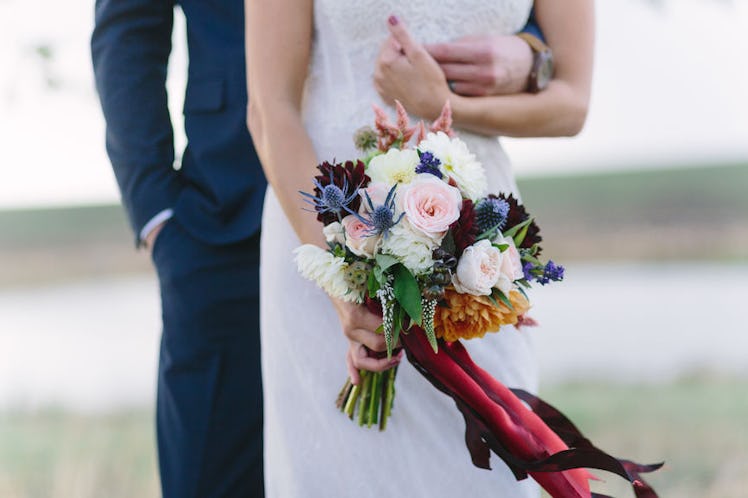
Relationship Experts Explain If People In Arranged Marriages Can Really Fall In Love
I’ll admit it. Whenever I meet one of those couples who seems head over heels in love, the first thing I ask is, “how did you meet?” Then, like any hopeless romantic, I eagerly devour every detail they reveal about their story. But what if their story isn’t that they accidentally took each other’s Starbucks orders, or bumped into each other at a concert? In many parts of the world, marriages are still arranged. Which begs the question: Can people in arranged marriages really fall in love?
Arranged marriages may not seem like a super romantic notion, but here's the thing: One 2012 study by Statistic Brain showed that the global divorce rate for arranged marriages was just 6 percent. That’s super low when you consider that about 40 to 50 percent of U.S. marriages (most of which are not arranged) end in divorce. Not only that but a 2012 study conducted by Psychology Today researchers revealed no difference whatsoever between couples in arranged marriages and those in free choice marriages on the four measures included in their study, including passionate love, companion love, satisfaction, and commitment. Regardless whether their spouse had been freely chosen or selected by family members/matchmakers, participants were equally happy with their relationships.
People in many countries — including India, Pakistan, China, and Japan — still adhere to the tradition of arranged marriages, and as studies have shown, many of those marriages seem to last. Still, the question remains as to whether those couples eventually fall in love after saying “I do.” Today, many of us have gotten so used to the idea that first comes love, then comes marriage. But can it ever be the other way around?
According to licensed clinical social worker Melanie Shapiro, it can indeed work the other way.
“Love takes all kinds of shapes and forms,” she tells Elite Daily. “In my practice, I have seen all different kinds of relationships and different types of people fall in love.”
Susan Trombetti, matchmaker and CEO of Exclusive Matchmaking, adds that mutual respect, caring, and an open mind are all crucial to success. And Shapiro agrees: She says an arranged marriage requires no less work than any other marriage does does.
“It’s essential that both partners have a shared understanding of the priorities in the relationship and marriage,” she says. “If each partner has the same priorities (ie. family, work, love, passion) whatever they may be, and they agree to support each other in their shared goals, then it can work.”
Couples in arranged marriages may not know their spouses as well by the time they exchange their vows. However, experts say they may be more likely to view marriage from a practical standpoint rather than getting blinded by passion.
“Chemistry grows over time,” says Trombetti. “You might not have lust off the bat, but how many times do you wind up repulsed by the person you were initially attracted to? It works the opposite way with chemistry in an arranged marriage. It’s a slow burn.”
Not to mention, couples in arranged marriages aren’t typically paired up randomly: whether the marriage is being arranged by the couples’ families or a matchmaker, their traits, values, and beliefs are taken into account — which means they’re likely to be compatible.
Take David and Elizabeth Weinlick, for example. The Christian Science Monitor reports that David’s friend Steve Fletcher helped him to put out a press release announcing that he wanted to get married on a particular date, but had yet to find his bride. Their group of friends, who assisted in circulating the release, raked in hundreds of responses. And dozens of women appeared to meet David and be considered as potential brides. At the time of the article’s publication, he and Elizabeth, who he met through this process, had been married for 10 years and had three children.
"We love each other more every day,” Weinlick said, adding that their shared values have been the key to their marriage’s success.
On the Lifetime reality show Married at First Sight, which is in its eighth season, singles who’ve struggled to find a spouse allow a team of experts to evaluate potential partners for them based on psychology, sexuality, and spirituality. Not only that, but the experts coach them both before and after they say “I do,” in order to help them prepare for and adjust to married life. And many of these couples have stayed together after the show ended, demonstrating that sometimes a third party can help you vet prospective life partners just as well if not better than you can yourself.
“Every couple has unique relationship circumstances,” says Shapiro. “And like individuals, each marriage has different strengths and challenges.”
Trombetti adds, “In the U.S., we believe in following our heart. But that only works out 50 percent of the time.”
There is no such thing as a "right" kind of marriage: All relationships take hard work, patience, and mutual respect. However, in some cultures, and for those who haven’t had luck finding love on their own, arranged marriages can provide a viable way to find a life partner. The bottom line is this: Experts agree that couples who get hitched via an arrangement can indeed fall just as deeply in love as those who meet by chance. Ultimately, the success of the marriage depends not on how the individuals met, but on the work they put in after saying “I do.”